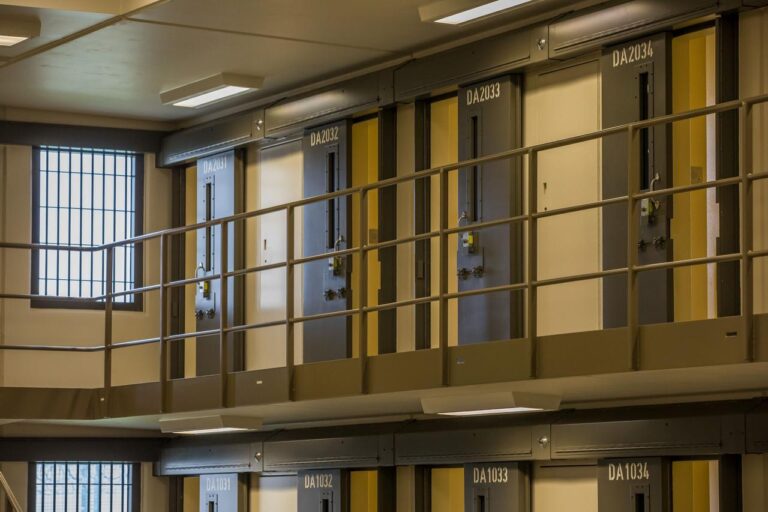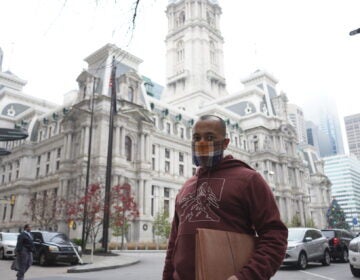Federal judge orders Philly to test all staff and prisoners at city jails
The prison system has never tested all of its staff for COVID-19. Officials pledge to release the results in January.

In this file photo, the interior of a prison is pictured. (Commonwealth Media Sercices)
Amid a surge of coronavirus cases inside city jails, a federal judge has ordered the Philadelphia Department of Prisons to perform one-time COVID-19 testing of all prisoners and staff members, including correctional officers and supervisors.
Officials with the department, which does not require staff to get tested, pledged Monday to release the results at the end of January.
U.S. District Judge Berle M. Schiller also ruled last week that all incarcerated people must get a minimum of 45 minutes each day to shower, make phone calls, and exercise. Prisoner rights’ advocates say some people in prisons and jails have reported getting 20 minutes — or less — to complete those tasks since the department adopted “shelter-in-place” measures in early December. Similar restrictions were in place during the lockdown implemented during the first two months of the pandemic.
Prisons commissioner Blanche Carney discussed the court order, part of an ongoing civil rights lawsuit, while getting an earful from city councilmembers during an emergency hearing called to discuss the department’s pandemic response.
Lawmakers raised concerns about the department’s practice of placing infected prisoners in solitary confinement, challenged its decision not to publicly release data about staff positivity rates, and took issue with charging families to have virtual visitations with loved ones living on the inside.
At the time of Monday’s hearing, the city’s jails reported 41 active cases — asymptomatic and symptomatic — of COVID-19. Since the start of the pandemic, the department has recorded a total of 1,020 positive coronavirus cases, according to the city. The system currently has just over 4,300 prisoners.
To date, one prisoner has died from the coronavirus. Carney said one staffer has also succumbed to the virus since March.
The city’s COVID-19 website does not provide infection data on jail staff. A spokeswoman said there are no plans to change that policy.
Carney told councilmembers the department tracks the number of staff who call out due to COVID-19, as well as the positivity rate among employees. She said the department doesn’t publicly release those numbers in the name of public safety.
“We did not want to announce to the public or the inmate population, the challenges that we faced with the COVID-19 regarding the ability to provide coverage,” said Carney.
Pressed to provide staff data during the hearing, Carney could not oblige.
Councilmember Helen Gym was not pleased. “I’m distressed that we don’t have those numbers in front of us,” she said.
A corrections officer testified Monday that more than 300 staffers have tested positive for COVID-19 since the start of the pandemic.
The department has never tested all of its employees for the coronavirus.
In May, the city tested all asymptomatic prisoners for COVID-19. The results showed that 6% of them had the highly-contagious virus.
Early on in the hearing, Councilmember Cindy Bass expressed concerns about the department using solitary confinement to separate infected prisoners from others in their housing unit, calling the practice punitive and “absolutely unacceptable” given the “extreme psychological effects” solitary confinement can have on individuals.
“There’s got to be another way,” she said.
Carney defended the practice.
“Right now, with that increased infection in our facilities, it does seem punitive, but it was our only option at that point to stop the spread of the virus,” she said.
For months now, families have been unable to make in-person visits, making phone calls the primary means of keeping in touch with relatives locked up on State Road, the city’s prison complex in Northeast Philadelphia.
Starting Dec. 15, the department began offering families two free video calls a week lasting 15 minutes each. Under the new program, they have the option of adding 30 minutes a week of video calling time, but only if they pay 25 cents a minute, or $7.50 for the entire half-hour.
Councilmember Kendra Brooks told Carney that amount isn’t nominal for many Philadelphians.
“Keep in mind, we’re talking about family members who don’t even make $15 an hour,” said Brooks.
Carney said the Philadelphia Department of Prisons earns some money from the additional calls, and that it’s reinvested in programming for incarcerated people. She added that she’d like to provide more free video visitations, but would need help from Council during the upcoming budget process.
In response, Councilmember Allan Domb said he would donate $10,000 of his own money to cover the costs of additional virtual visits.

Get daily updates from WHYY News!
WHYY is your source for fact-based, in-depth journalism and information. As a nonprofit organization, we rely on financial support from readers like you. Please give today.



![CoronavirusPandemic_1024x512[1]](https://whyy.org/wp-content/uploads/2020/03/CoronavirusPandemic_1024x5121-300x150.jpg)


